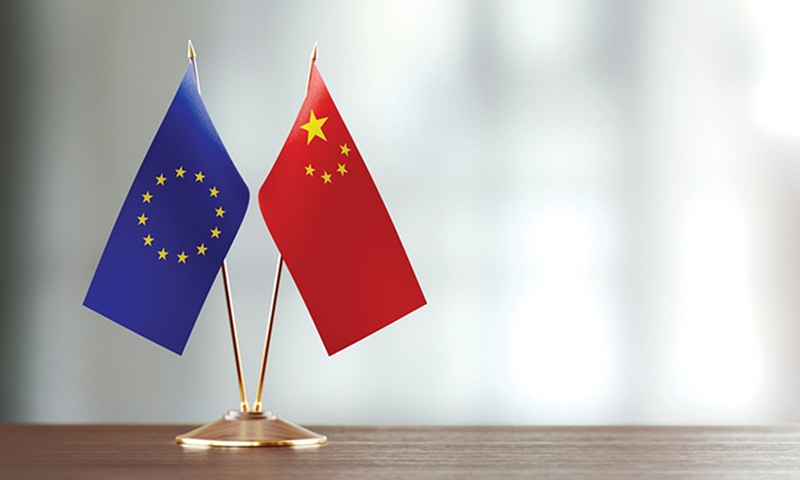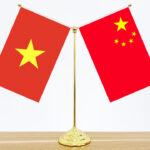The European Parliament, which has been described by some as the “anti-China” base, adopted a report on EU-China relations on Wednesday, claiming that China is a partner of the European Union, but also increasingly a competitor and systemic rival.
It also calls for a review and update of the EU’s 2019 strategic approach to China in light of the new geopolitical context and urges the EU to engage pragmatically with China on global challenges while continuing to confront China over human rights issues in its Xinjiang, Xizang, Hong Kong, and Macao.
China firmly opposes the European Parliament’s report and resolution for they seriously infringe upon China’s sovereignty, interferes in China’s internal affairs, and violate the basic norms of international relations and the political commitments of the European side, the Chinese Mission to the EU said in a statement on Wednesday.
The Chinese Mission to the EU also noted that China-EU relations, in particular, should not be hijacked by ideology and geopolitics, noting that conflict and confrontation are harmful to both sides and the world.
While the 24th China-EU Summit, which was held in Beijing on December 7, has offered opportunities for the two sides to promote exchanges and manage divergence, the report and resolution have shown that the perceptions on China within the EU remain mixed and complicated. Ideological prejudice inside the EU may have an impact on the stable growth of China-EU ties, analysts said.
The European Parliament has always taken a hard-line stance toward China, and the report and resolution showed that in the triptych of being a partner, competitor and rival, some members of the European Parliament (MEPs) have only taken China as a competitor and rival, focusing only on the divergences between China and the EU, Sun Keqin, a research fellow at the China Institutes of Contemporary International Relations, told the Global Times on Thursday.
While China has always valued cooperation with the EU as a partner, it does not agree with the EU referring to China as a systematic rival, analysts said.
During his speech to the European Parliament plenary on Tuesday, EU foreign policy chief Josep Borrell noted that he spent quite a long time trying to explain what “we mean to be a rival” and then used the example of Real Madrid and Barcelona to say being rivals means that they have different goals and each one wants to win.
In the report adopted on Wednesday, some of the MEPs falsely claimed that “China is, of its own accord, clearly shifting the core of our relations towards systemic rivalry.”
In response, the Chinese Mission to the EU said that the report and resolution recognize China as a partner of the EU, but they greatly exaggerate ideological and value differences between China and Europe, emphasizing that the two sides are systemic rivals. Such statements do not contribute to the improvement and development of China-EU relations.
Stressing that China is a systemic rival, hyping human rights topic and the Taiwan question that China and the EU diverge have been the effective means taken by some anti-China MEPs to sabotage the bilateral relations, said Sun.
Also on Wednesday, the European Parliament adopted a resolution, calling on the European Commission to strengthen cooperation with the island of Taiwan in order to boost economic, trade and investment ties.
Analysts noted that any form of official cooperation with China’s Taiwan will seriously damage China-EU bilateral relations, and will be resolutely opposed by China. The newly adopted resolution is not conducive to the development of China-EU relations.
Li Yong, a senior research fellow at the China Association of International Trade, said that what the EU has done since the China-EU summit shows the duplicity nature of saying one thing and doing another and it goes against the general trend of China-EU economic and trade relations and sends out a negative signal.
Hearing more rational voice
In the report adopted on Wednesday, MEPs also discussed economic ties with China, stressing the need to advance de-risking with China and highlighting the importance of balanced trade relations.
On the issue of trade balance, China has repeatedly said it does not deliberately pursue trade surplus, and the current trade status is determined by the industrial and trade structure of the two sides, Li noted.
“The two sides could have sought a win-win solution to the trade balance issue through consultation. Unilateral measures taken by the EU not only violate world trade rules, but also undermine the atmosphere of trade consultations, which is not conducive to solving problems, but may create more problems,” Li stressed.
A European logistics company, which refused to be named, told the Global Times on Thursday that many European companies are now building factories in China and then ship parts or products to Europe for sales, which are also counted in China’s export volume to Europe.
“The trade imbalance between China and Europe does not mean that China is the only beneficiary of the bilateral trade. In fact, these products, especially components, are very important to the European industrial chains and the supply chain,” a manager of the company said.
What’s more, the company now transports a large number of products between China and Europe via the China-Europe Railway Express, which has reduced a large part of the transportation cost while improved efficiency.
China and the EU have extensive common interests than differences, including in maintaining a stable and open international order and tackling global challenges, such as climate change, said Sun.
The expert urged the EU to keep strategic independent, adhering to the pragmatic way in cooperating with China and hearing more objective and rational voice on the bilateral relations within the EU.
In the statement released on Wednesday, the Chinese Mission to the EU also noted that during the discussion at the European Parliament plenary session, some MEPs also emphasized that China is an important partner of the EU and called for enhanced dialogue and proper handling of differences.
These objective and rational voices should not be drowned out by the noise based on ideological prejudice and false information and the European Parliament should do more things that are beneficial to the development of China-EU relations, said the Chinese Mission to the EU.




